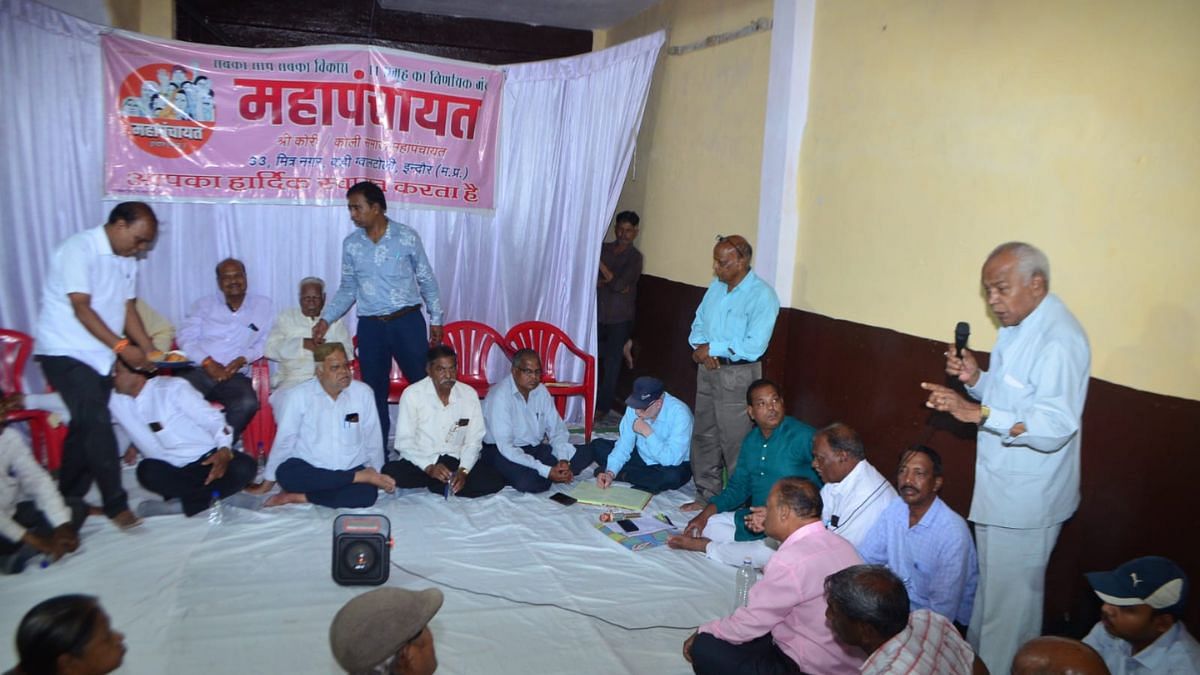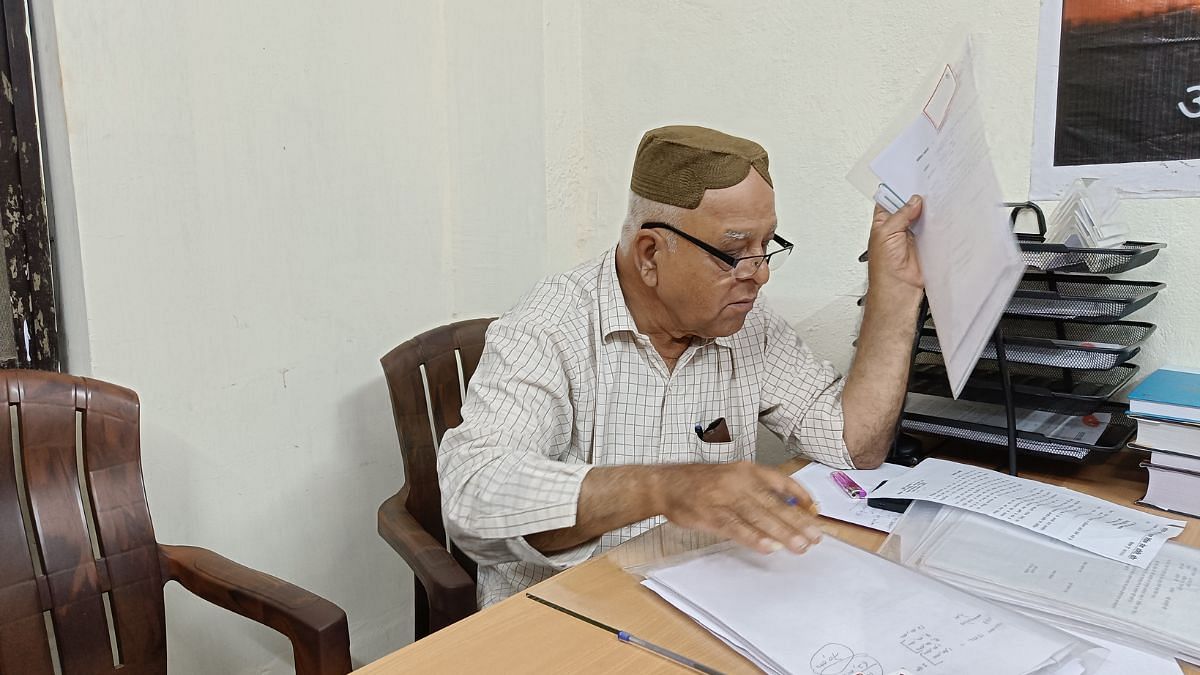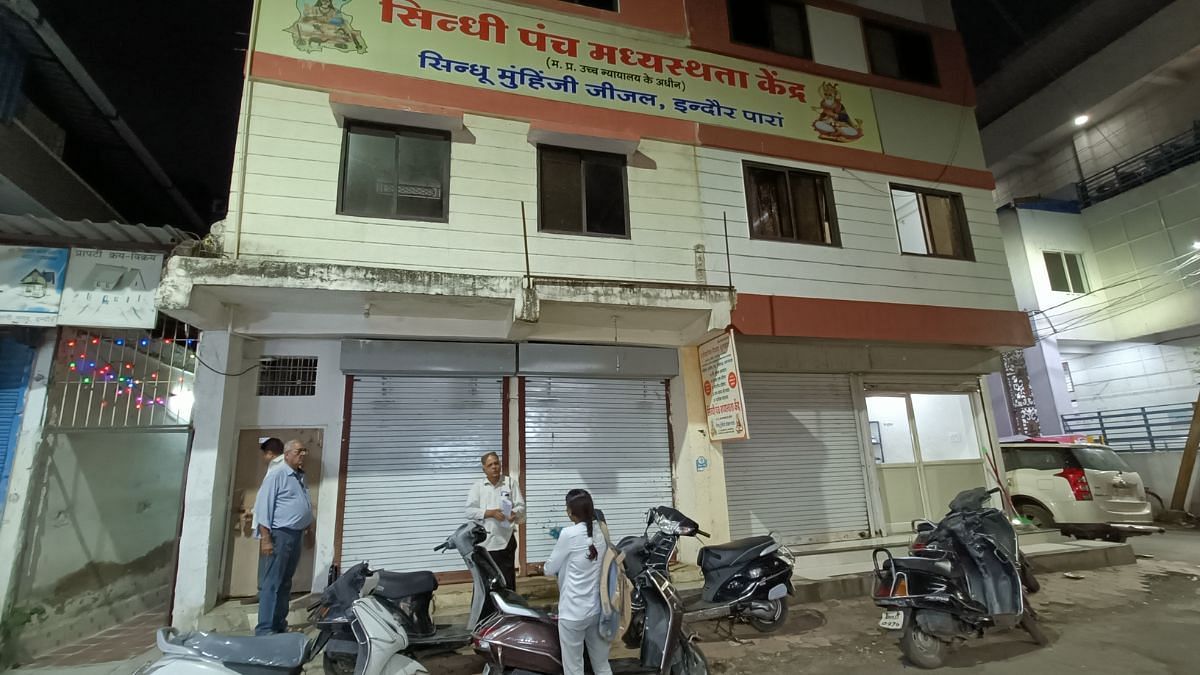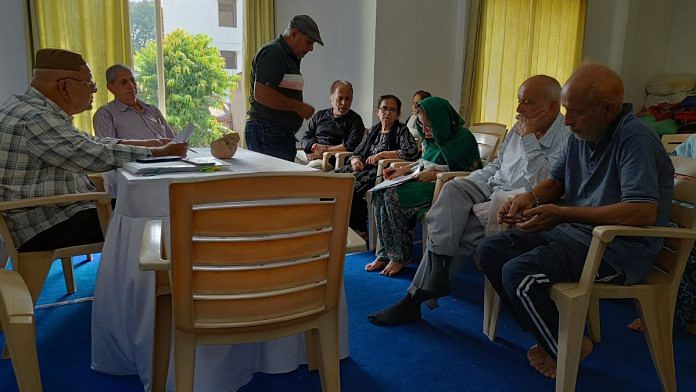Indore: The hall looks like a courtroom, the judge gives a patient hearing, and the two warring sides air their disputes. Except it’s not a courtroom. It is a Sindhi community mediation centre in Indore that is functioning like a court but actually helping the district court of Indore and the high court bench from clogging further.
It’s 10 in the morning and one of the rooms at Swami Pritamdas Auditorium in Indore’s crowded Sindhi Colony is packed, ready for the 8th hearing of the Sevkani family dispute. The family members occupy the plastic chairs in the hall, eager to be part of the hearing even as the noise from a nearby flour mill makes the proceedings loud. The resolution involves deciding fair partition among the members. The younger of the two sisters has reached the mediation center with the bale of 33 tola gold, all ancestral property. The plaintiffs and mediators speak Sindhi, something that helps them articulate better. Chief mediator Kishore Kodwani, wearing a traditional headgear, leads the proceedings as two other mediators, both Sindhis, help him with case papers. The hearing that lasts over two-and-a-half hours, barring a 10-minute break, leaves the women of the family teary-eyed. They say the fight over money and property has destroyed all the love they had.
But the community mediation centre holds hope even if it doesn’t have the legal teeth of a regular court. Mediators working with the plaintiffs are filling a key gap in India’s justice delivery system. This experiment is fast catching up among other communities in the Indore region with some of these centres functioning out of dharamshalas and temple premises. And cases are heard on a weekly or monthly basis. According to the National Judicial Data Grid, 49,550 civil cases are pending in Indore and 11,713 civil cases in Ujjain.
And it all began with a judge’s out-of-the-box thinking who informally proposed to Madhya Pradesh State Legal Services Authority (MP SALSA) the idea of an anteroom for cases before they are litigated. “Courts have their own limitations and they work under them. But the mediation gives a solution to all — both parties. No one can lose in mediation and people also get rid of physical, mental and financial problems, which they face in court cases,” says Sudesh Dhamwani a retired district judge who.
Efforts like community mediation centers bring good to society; quick justice is delivered and everyone is happy, he adds.
Punctuality, confidentiality, and a courtroom-like discipline are key features of this Sindhi panchayat. Except it’s not a judge’s gavel that brings order but a community strongman who holds significant influence over his people. And there is nothing adhoc about it. The centre tackles disputes Monday to Friday between 5 pm and 8 pm.
The Sindhi panchayat is run from the first floor of a two-storey building in Sindhi Colony, but because the Sevkani family case has large number of attendants, the proceedings had to be moved to the adjacent auditorium. There are three rooms in the panchayat centre and different parties are heard in different rooms. One of the walls has messages such as: Kshama hi chhutkara hai (Forgiveness is the only salvation) and Samjhauta hi samadhan hai (compromise is the solution). Books on law also stacked — Hindu Law, Criminal Major Acts, Marriage and Divorce Laws along with the photo of lord Vishwakarma.

Also read: Greater Noida worse than Delhi as a pollution hotspot. They’re playing ‘your air my air’ game
The authority
Often referred to within the community as ‘Indore ka Gandhi’, social activist and chief mediator Kodwani brings authority to the court, something that’s key to justice delivery. As an influential member, he is inspiring trust among his people.
A dispute regarding a transaction that involved a sum of Rs 3.5 lakh was unresolved for over three years. Notices from the mediation centre were sent to both parties. “Sometimes cases are solved due to my influence. When they came to know that Kishore Kodwani was involved in the resolution, both agreed to resolve the matter among themselves, they came to the center and got the documentation done,” he says.
Kodwani, 68, carries a distinct identity. Flipping through the documents of cases that came in the last few months, he says, “There is an unequal distribution of ancestral property in this family (Sevkanis). When the case came to us, we called all parties and tried to mediate.” The Sevkani family is reputed and many members have businesses spread in Indore and Bhopal.
When the eldest brother of the family came to the Pritamdas Auditorium with his wife and son, he was not ready to settle via mediation. He declared loudly he didn’t accept this method of settlement. Then Kodwani intervened: “If you do not agree, then write it on paper so that we can take it forward (to the court).” The family member gave in. That’s the influence Kodwani enjoys among his people. Mediation centres have been mandated by MPSALSA to inform about all disputes that come to them.
Sitting in his office at the Sindhi Panchayat, his head leaning on his left hand fist, Kodwani frequently smokes a cigarette to handle the stress from the community work, to which he devotes 8-10 hours daily. Kodwani is in social work for more than 40 years. His father was a well-known journalist in the Indore region who ran a Sindhi newspaper. Kodwani has also been associated with various environmental cases.
“I work with so much load to ensure injustice is not done to anyone. People come to me with trust,” he says.
“We turned to the mediation center because it is for the people of our society and only our people take the hearing here. There is confidence in presenting our views and everything remains confidential,” says one of the plaintiffs present at the Swami Pritamdas Auditorium.
As of September 2023, 56 cases were registered at the Sindhi Mediation Centre, that range from financial to family disputes (partition, divorce etc).
“We did not expect that so many cases would start coming so soon after the center opened in end June. Out of the 56 cases, we have disposed of 12. We aim to provide resolution in 10 weeks but some cases were disposed of even before,” says Kodwani.
There are 26 people in Kodwani’s team and everyone gives two hours a day per week to the centre. His team includes lawyers, social workers, advocates and retired judges.

Also read: Mumbai doesn’t want to become Delhi. BMC, Bombay High court crack down on AQI
Better than courts
The Sindhi mediation center is among a growing list of community driven justice initiatives that is mushrooming in the Malwa belt. However, unlike the Sindhi experiment, which appears elaborate vis a vis infrastructure and number of cases, others still seem to be taking shape. Communities, including Muslims, Agarwal, Bohra, Jain, Brahmin, Yadav, Vaishya, Kori-Koli, Sindhi, Nema among others are adopting this mode of justice.
Rahul Sukhani, advocate who hails from the Sindhi community, gives his two hours every week at the Indore mediation centre. “I have seen in the courts that in case of family disputes, property or financial disputes, the plaintiff keeps doing rounds of the court for years and gets nothing except loss.”
Sukhani appears confident of this new evolving system and says if this resolution mechanism works properly, it may hurt lawyers’ business as cases coming to them would dry up. “Social and moral responsibility is very important and we should resolve these issues on a community level,” he says.
Earlier this year CJI DY Chandrachud mentioned the importance of mediations in tackling case pendency. “We stand at the dawn of the golden age of mediation. Mediation should not be considered as just an alternate dispute resolution mechanism,” he had said.
In September, India passed the Mediation Act 2023. “Any dispute likely to affect peace, harmony and tranquillity amongst the residents or families of any area or locality may be settled through community mediation with prior mutual consent of the parties to the dispute,” it reads.

Also read: NHRC’s image crisis has peaked. In 30 years, ‘toothless tiger’ to ‘not even ornamental’
The legal hand holding
The mediation centres across Indore, Ujjain, Dewas are receiving the legal guidance from the MPSLSA that’s providing training to eminent persons of respective communities, after which mediation is initiated. The MPSLSA chooses the eminent persons from the communities — Professors, social activists, journalists, doctors, city qazi.
There are many court-run mediation centres in the country and there are other modes of mediation such as private mediation, community mediations and pre-litigation mediation.
“Matters have always been resolved at the society level by involving elders,” says Deepika Kinhal, a Senior Resident Fellow and team lead for the JALDI (Justice, Access and Lowering Delays in India) initiative at Vidhi Centre for Legal Policy.
Khap Panchayats also sorted out community matters, but the way they expressed their opinion on matters related to marriage and gender, they became infamous, adds Kinhal.
In December 2021, the Madhya Pradesh High Court Legal Services Committee Division Bench, Indore had given training in community mediation to eminent persons of 16 communities. Although no member of the Sindhi community was involved in that training, they were asked by the Legal Services Committee to participate in another training programme.
On behalf of the Madhya Pradesh High Court Legal Services Committee, Master Trainer Mohammad Shamim gives mediation training to people from different communities. “These training programs were started due to Justice Vivek Rusia’s vision of community mediation in the Indore bench of MP High Court,” he says.
Shamim says that 20 hours of training is given to eminent people in which they are informed about the basics of mediation. “In the training, how to mediate, what things need to be kept in mind and how to mediate within the law, all this is taught.”
That these centres are inaugurated by the officials of the district courts again underlines the will of the judiciary when it comes to reducing caseload.
Shamim says this model is proving to be very successful in Indore. “The increasing pressure on the courts has raised this as an alternative and it will only benefit the people.”
Also read: Green tops, imported grass, better seats—Cricket stadiums upped the game but fans want more
The challenges
For the cases, a three-member bench is formed at the Sindhi centre, which includes a woman, a lawyer and a social worker and the identity of the plaintiff is kept confidential. But in the Sindhi panchayat, the condition for resolving the case is that at least one person should be a resident of Indore and belonging to the community. However, other mediation centers hear matters only when both parties belong to the community.
“Sometimes, matters are complicated. It gets difficult to find a solution,” says Kodwani. Kodwani says it is for this reason that they hold small meetings with all the parties before they begin proceedings.
According to Kodwani, the model of community mediation center can be successful in urban areas such as Indore, Ujjain but won’t work in rural areas. “Caste structure is quite rigid in villages, there may be challenges in implementing it,” he says.
Despite the buzz in certain circles, these mediation centres have still not been publicised on a wide scale and some even faced practical challenges. The Kori-Koli community in Indore successfully settled 55 out of 60 cases reported in the last one year but people were not happy that the hearings were brought to their drawing rooms. Mahesh Verma, member and mediator of the Kori-Koli Mediation Center, says that initially they would go to people’s homes to hear cases. But there were incidents where we faced flak from concerned parties who alleged justice was compromised because the hearing didn’t occur at a neutral ground. “Later, we shifted the hearings to the society’s dharamshala that happens on a monthly basis,” he says.
According to Kodwani, the model of community mediation center can be successful in urban areas such as Indore, Ujjain but won’t work in rural areas.
Underlining the nuance required to solve matters within the boundaries of the community and their sensitivities, Verma says, “the nature of every community is different but the court runs only on the basis of justice. In these centres, justice is done according to the nature of the community and efforts are made to make everyone understand.”
In September, a case for divorce came up in the Kori-Koli community. Initially, both the parties were counselled but when things didn’t work out, the divorce was approved in the presence of everyone. Verma says there are 11 sub-castes within his community and one person from each has been linked to the group. “Decisions on keeping records of cases, procedure and dates of hearing are made on WhatsApp groups,” says Verma.
In the last one year, six cases of the Jain community came to the mediation centre, out of which three were settled. Narendra Dhakad, head of the Jain mediation center and former vice chancellor of Devi Ahilya Vishwavidyalaya says, mediation gives a win-win situation, no one loses, it saves time and money.
Also read: A scientist rescuing Delhi museum species from bugs & blight. They’ll survive for next 200 yrs
Lack of female representatives
When people from 16 different communities were given training in Indore, the participation of women was less. Last year, 75 people received mediation training, of which only 10 were women. The women who took the training say that they have been included in the justice process at the social level, but their voices remain suppressed.
Tarannum, 29, who works at a private bank, was among those who took training from the Muslim community. She has been involved in social work dedicated to Muslim women in Indore for a couple of years.
There are many cases of dowry and divorce in the Muslim community. “Polygamy is a big problem and such cases come to arbitration centers but these cases are often not looked at from women’s perspective,” she says.
Of the 22 people from Muslim community who received training, only two were women. “As women in a patriarchal society, we have been included in the justice system but we still do not get a chance to speak. We are often stopped by senior people in the community,” says Tarannum.
As women in a patriarchal society, we have been included in the justice system but we still do not get a chance to speak. We are often stopped by senior
people in the community
— Tarannum, Muslim community mediator
But one advantage of hearing cases at the community level is that the arbitrators there are known to the litigants, which increases the trust. “But in government arbitration centers, the arbitrators are strangers. To ensure that there is no injustice to women in the patriarchal setup, mediators should be trained and more and more women should be included in it,” says Kinhal.
However, Kodwani claims the Sindhi Panchayat has done the work of removing all these challenges and shortcomings in its system. “The center of my community was set up last. I first understood the way of working of other communities and worked toward removing those shortcomings.”
“Whenever a case comes to me, a woman is definitely included in it for hearing so that it helps in understanding the issue from the women’s perspective also,” he says.
What happens at a particular mediation centre is also limited or governed by the intrinsic cultural mores of a community. The boundaries of justice are set within the collective walls of a society.
The Maheshwari community of Ujjain has also included women in its centre. 72 people from different communities have received training in Ujjain. “There are five people from our community, including two women, and all have been trained in mediation,” says social activist and journalist Bhupendra Bhutada, who is also the chief mediator at Maheshwari community centre in Ujjain.
Beyond property, partition and marriage disputes, there are some that truly test the patience of even a seasoned mediator. An old woman brought the matter to the Sindhi Panchayat that she wanted to meet her son but her son was refusing.
“On one side his mother was crying and on the other side I was crying. I didn’t know what to do. Kodwani admits it is his most difficult case so far.
(Edited by Anurag Chaubey)



